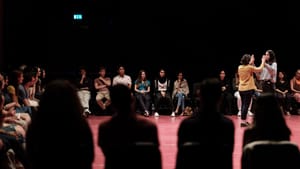Stay in the Loop
BSR publishes on a weekly schedule, with an email newsletter every Wednesday and Thursday morning. There’s no paywall, and subscribing is always free.
Party tricks
PIFA 2018: 600 Highwaymen's 'The Fever'

After the opening PIFA performance of 600 Highwaymen’s The Fever ended, my companion repaired to the nearest bar and ordered a Dark and Stormy. “I need to drink something that matches my mood,” he explained.
I couldn’t blame him. An amorphous work of collaborative storytelling presented as part of the Philadelphia International Festival of the Arts, The Fever purports to “test the limits of the individual and collective responsibility and our willingness to be there for one another.” But what was tested during its interminable 75 minutes was my patience.
Trust issues
Creators Abigail Browde and Michael Silverstone take the erosion of audience and performance as their lofty goal. They begin under the false pretense of a narrative, telling of a party given by a woman named Marianne in an unnamed U.S. city.
Audience members are instructed — invited would be too passive a word — to rise from their seats in the Kimmel Center’s SEI Innovation Studio and mimic the mechanics of partygoing: carting in six-packs of beer, dancing with friends and strangers, assembling small groups to observe and gossip.
Browde and Silverstone — who perform the piece with Bryan Saner, Marchánt Davis, and Jax Jackson — capture the small intimacies that pervade these gatherings. (Why is it that everyone eventually congregates in the kitchen?) Had they kept this thread going, they might have found a way to explore the intersection of social dynamics and performative rituals. But Marianne is quickly forgotten in favor of something resembling the banal exercises one finds at a corporate retreat.
A classic trust exercise goes on far too long. By the third time Saner fell to the floor, unable to be caught by a group of sincere volunteers, I was content to leave him prone. Moments later, the audience became a makeshift mosh pit, buoying Jackson through the air. But the moment held none of the spontaneous joy one experiences crowd-surfing at a concert in a moment of communal abandon. It felt rote.
Davis plucked a young woman from her chair and invited her to jog the periphery of the playing space with him. I envied their Fitbits without fully comprehending how the act represented radical empathy.
No heat
Silverstone asks questions about the development of identity — “What was the first opinion you formed?” — without inviting anyone to answer. This section, overlong and ponderous, calls to mind the pseudo-profundity of an Apple commercial. Other moments reminded me of EST, the hoary self-actualization seminars from the 1980s so perfectly skewered on FX’s The Americans.
Perhaps I was unwilling to give myself over. Forced participation raises my red flags, and I’m allergic to highly scripted performances that strive to feel improvisatory.
But even a sympathetic observer could tell that Browde and Silverstone have intricately choreographed the flow of the performance, with very few organic moments allowed. An eerie soundtrack (composed by Brandon Wolcott and Emil Abramyan) regularly breaks in to signal emotional cues — feel scared, feel energized, feel catharsis.
If the goal of The Fever was to test my limits, it failed. I didn’t feel tested; I felt manipulated. Theater overflows with unforced empathy as it is. The idea that an audience will reach new plateaus of compassion and emotional understanding by clasping hands with a stranger in the dark doesn’t cut the mustard.
Like so much experimental performance art, The Fever feels far more facile and austere than the form from which it diverges. Its temperature doesn’t rise.
What, When, Where
The Fever. Written and directed by Abigail Browde and Michael Silverstone, in collaboration with Brandon Wolcott, Emil Abramyan, and Eric Southern as 600 Highwaymen. Philadelphia International Festival of the Arts. Through June 10, 2018, at the Kimmel Center’s SEI Innovation Studio, 300 S. Broad Street, Philadelphia. (215) 893-1999 or pifa.org.
Sign up for our newsletter
All of the week's new articles, all in one place. Sign up for the free weekly BSR newsletters, and don't miss a conversation.
 Cameron Kelsall
Cameron Kelsall